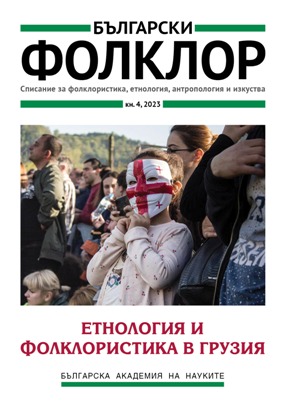Св. Георги в грузински културен контекст
St. George in Georgian Cultural Context
Author(s): Nino AbakeliaSubject(s): Politics / Political Sciences, Christian Theology and Religion, Politics, History, Anthropology, Social Sciences, Language and Literature Studies, Fine Arts / Performing Arts, Cultural history, Museology & Heritage Studies, Semiotics / Semiology, Customs / Folklore, Architecture, Geography, Regional studies, Library and Information Science, Human Geography, Regional Geography, Historical Geography, Classification, Theoretical Linguistics, Sociology, Ethnohistory, History of ideas, Local History / Microhistory, Theology and Religion, Comparative Studies of Religion, Morphology, Lexis, Semantics, Pragmatics, Historical Linguistics, Cultural Anthropology / Ethnology, Culture and social structure , Sociology of Culture, Eastern Orthodoxy, Philology, Social Norms / Social Control, Sociology of Religion, History of Religion, Politics of History/Memory, Identity of Collectives
Published by: Институт за етнология и фолклористика с Етнографски музей при БАН
Keywords: St. George; place of memory; shared sanctuaries; holy place; pilgrimage; traditional feast; hybridization
Summary/Abstract: The article briefly evaluates the vast literature relating to the worship of St. George in Georgia and draws on the ethnographic data collected by the author in the years 1977 to 1987. It explores the worship of St George in the Caucasus Georgia both in the past and present. Consequently, it discusses such categories as religious practice, belonging to the parish and territory, identity and, sharing holy places, epithets of the Saint, hybrid cults, etc. The materials used are: written historical sources, ethnographic data attested in the writings of Christian Missionaries (Christopher Castelli, Jean Chardin, Arcangelo Lamberti, etc.), the ethnographic data gathered (during 2018-19) among Internally displaced persons, and contemporary emic and etic researches undertaken by anthropologists of the 20th and 21st centuries. The argument of the present contribution is based upon a series of ethnographic observances that present traditional feasts of the saint and their transformations in the light of current political processes. Accordingly, detailed ethnographic field data and observations are contextualized in time and space, using the explorations and studies of anthropologists and historians. The article tries to show how once traditional Christian site (lieux de mémoire in Pierre Nora’s sense) with its real environment and with is firm identity is deterritorialized and transformed into a shared place of mixed and ambiguous pilgrimage place through the political processes and hybridization.
Journal: Български фолклор
- Issue Year: XLIX/2023
- Issue No: 4
- Page Range: 557-571
- Page Count: 15
- Language: Bulgarian
- Content File-PDF

